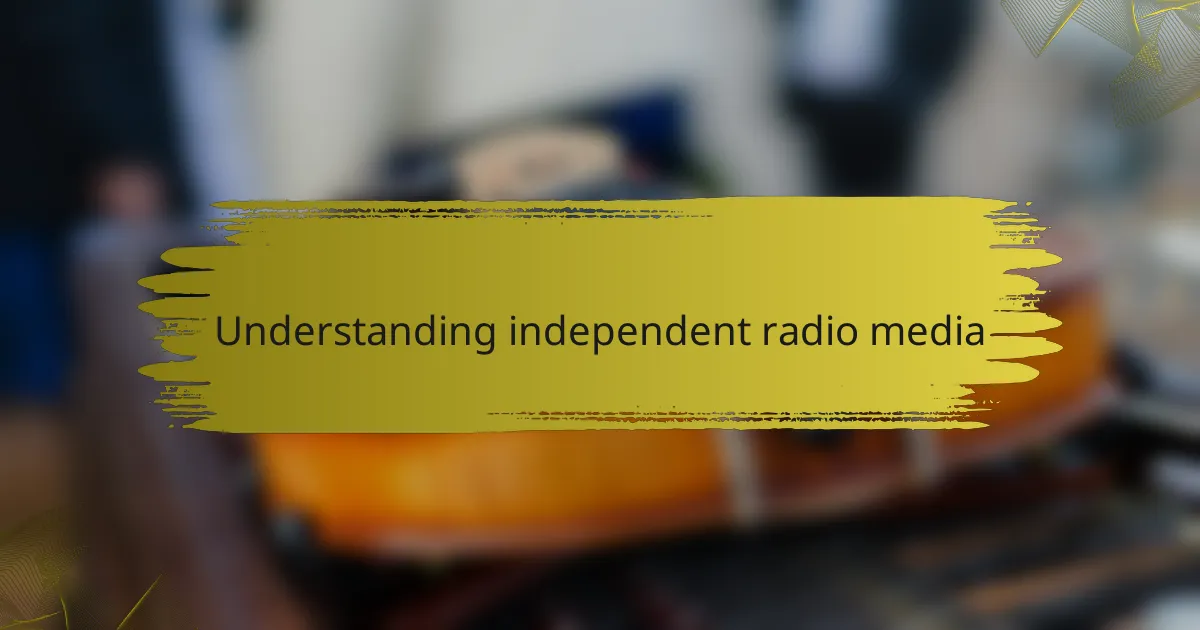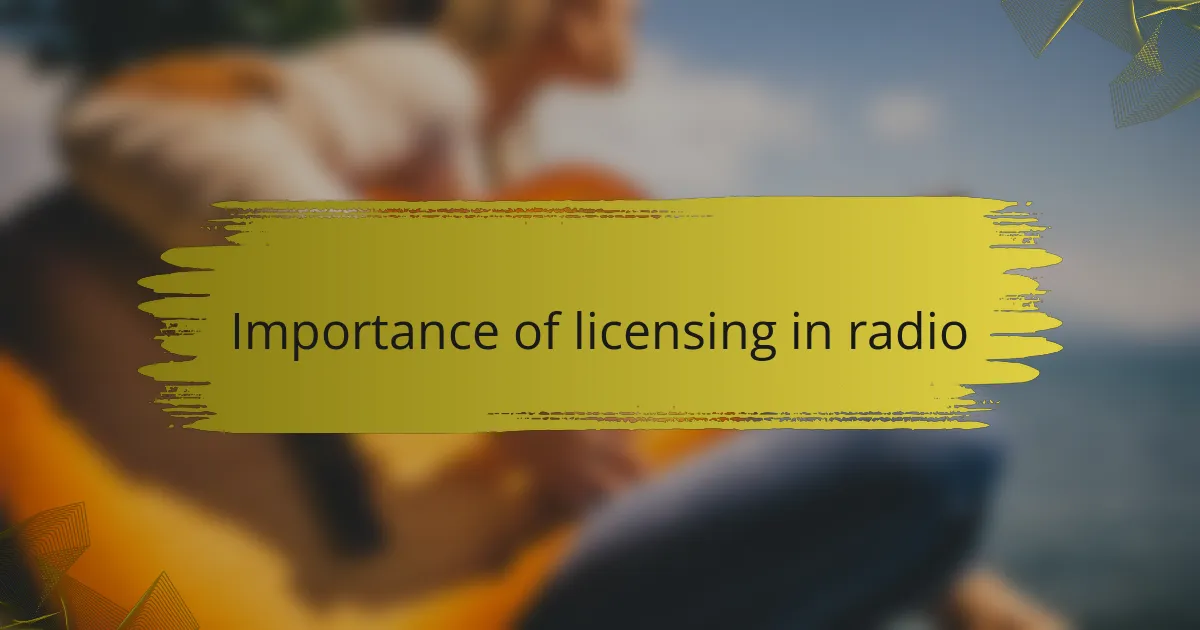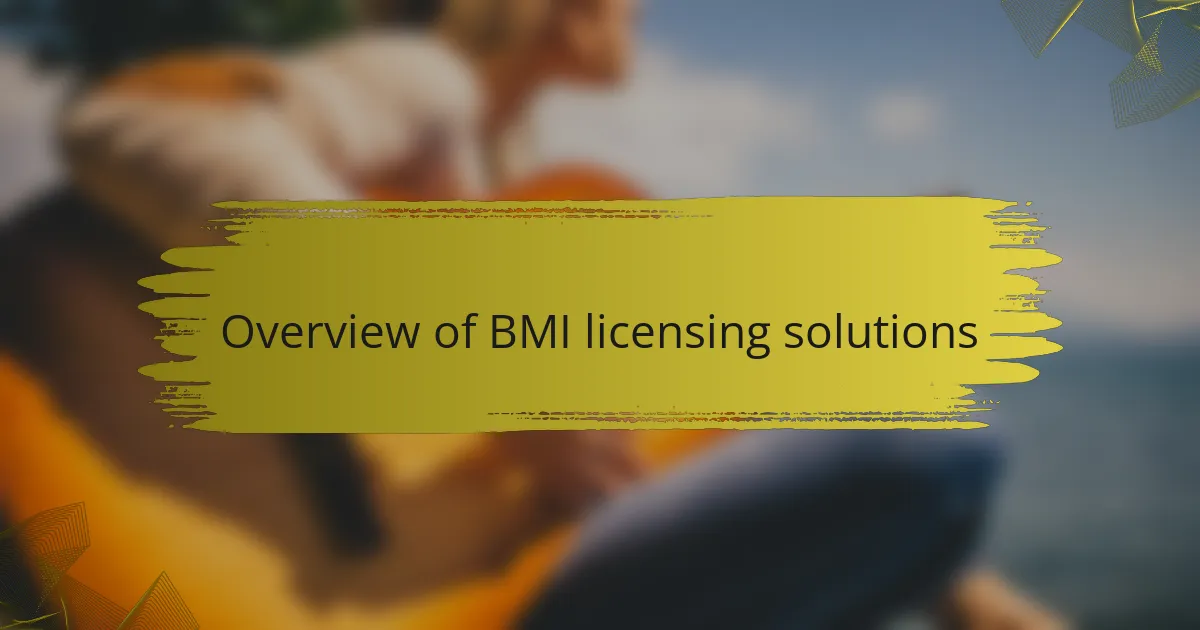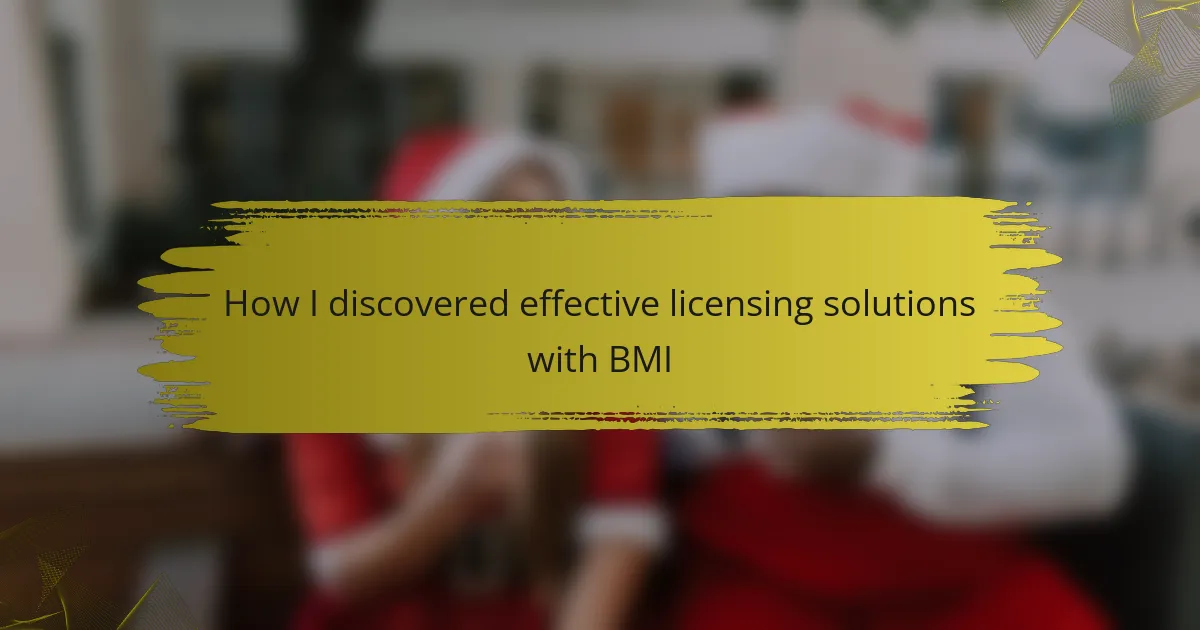Key takeaways
- Independent radio media fosters creativity and community engagement by amplifying diverse voices and local stories.
- Licensing, particularly through BMI, ensures fair compensation for artists and provides legal protection for radio stations.
- BMI’s various licensing options support independent stations, simplifying access to a wide range of music while encouraging innovative programming.
- Effective licensing builds trust with audiences, enhancing their listening experience and transforming casual listeners into dedicated supporters.

Understanding independent radio media
Independent radio media serves as a powerful platform for diverse voices, allowing creative expression beyond mainstream constraints. When I first tuned into an independent station, I was struck by the authenticity of the content. It felt like I was part of a community, where personal experiences and local stories shaped the soundwaves.
What I find particularly compelling about independent radio is its commitment to supporting local artists and issues that often go unheard. It’s a place where passion meets creativity, fostering a genuine connection with the audience. I remember discovering a hidden gem of a show that aired stories from my neighborhood, and it was like getting to know my own community on a deeper level.
- Independent radio thrives on the unique perspectives of local hosts.
- It promotes a sense of community involvement and engagement.
- The variety of programming often includes niche genres and underrepresented voices.
- Independent stations frequently highlight local events, musicians, and issues.
- Listeners build personal connections to the content, fostering loyalty and engagement.

Importance of licensing in radio
Licensing in radio isn’t just a legal requirement; it’s essential for fostering creativity and protecting artists. When I first started understanding the ins and outs of radio, I realized that licensing ensures that the music we love is respected and compensated fairly. Have you ever wondered what would happen if artists weren’t rewarded for their work? The vibrant landscape of independent radio could be stifled, and that would be a tremendous loss for all of us.
Moreover, licensing opens the door for diverse programming and unique content. I remember hosting a show that featured a local band, and knowing we were properly licensed felt like a badge of honor. It allowed me to share their music without the fear of legal repercussions, creating a sense of security that empowered my creativity and connection with listeners. Isn’t it amazing how something so bureaucratic can actually fuel inspiration?
Finally, having the right licensing in place builds trust with your audience. When listeners know that content is shared legally, it enhances their experience. They can settle back and enjoy the music, stories, and conversations without worry. This trust encourages loyalty, and I’ve seen it transform casual listeners into dedicated supporters of independent radio. Wouldn’t you want to be part of a community that thrives on respect and authenticity?

Overview of BMI licensing solutions
When I first delved into the world of music licensing, my discovery of BMI (Broadcast Music, Inc.) was a game-changer. Their licensing solutions not only simplify the process of obtaining performance rights, but they also provide a wealth of resources that can really support independent radio stations. I remember the peace of mind I felt when I realized that I could access a vast catalog of music while ensuring that artists were fairly compensated.
BMI offers various licensing options tailored to different needs. Whether you’re running a small community radio station or a larger independent outlet, they have solutions that cater to your specific requirements. It’s reassuring to know that you can find a plan that fits your budget while still supporting the artists whose music you love.
| Licensing Type | Features |
|---|---|
| General Performance License | Covers public performances of music in the BMI catalog. |
| Special Events License | For one-time occasions or events that feature music performances. |
| Digital License | For streaming and digital broadcasting, ensuring compliance with online music usage. |
| Station Licensing | Tailored plans for independent radio stations, offering flexibility based on audience size. |

Steps to obtain BMI licensing
Obtaining BMI licensing can seem daunting, but I’ve found that breaking it down into manageable steps makes the process much smoother. First, I recommend visiting the BMI website to understand the specific types of licenses relevant to your needs—there’s a wealth of information available that explains the different categories. From my experience, reaching out directly to a BMI representative can clarify any uncertainties and provide tailored guidance.
Next, gather the necessary information about your radio station, such as the format, the type of music you play, and your audience size. This information helps BMI determine your licensing fee. I remember when I first filled out the forms; having everything organized ahead of time significantly reduced my stress and made the process much more efficient.
Once you have the required information, submit your application online or through the provided channels. A few weeks after submission, I received my licensing agreement, which felt incredibly rewarding. It was a pivotal moment for my station, knowing we were legally covered to play the music we love.
| Step | Description |
|---|---|
| 1. Research | Visit the BMI website to understand the licensing options available for your radio station. |
| 2. Prepare Information | Gather details about your station, including music format and audience size, to facilitate the application process. |
| 3. Submit Application | Complete and submit your licensing application through BMI’s online platform or contact channels. |

Personal journey with BMI solutions
When I first started engaging with BMI solutions, I was both excited and a little apprehensive. The idea of navigating music licensing felt overwhelming, but I quickly found that BMI was incredibly user-friendly. I remember the moment I accessed their online resources; it felt like opening a door to a world of possibilities where my station could thrive without the fear of legal issues hanging over us.
One of the standout moments in my journey was when I participated in a BMI workshop. Listening to industry experts share their insights made me feel connected to the wider community of independent radio. They emphasized how crucial it is for us to support the artists we play. Has there ever been a time when you felt a renewed sense of purpose? That’s exactly how I felt, knowing that my licensing efforts directly contributed to the livelihoods of musicians.
As I continued working with BMI, I noticed their personalized support making a significant difference. I recall a conversation with a representative who helped me understand the nuances of licensing for digital streaming. Their patience and expertise alleviated my concerns, allowing me to focus on what I love most—creating engaging content for my audience. It’s these kinds of experiences that truly affirm the value of investing in effective licensing solutions.

Key benefits of effective licensing
When I turned to BMI for licensing solutions, I quickly realized the key benefits it offered for independent radio media. One major advantage is the ease of access to a vast repertoire of music. This means that as a station owner, I won’t have to stress over clearing each track individually. Instead, I can focus more on curating playlists that truly resonate with my audience.
Another benefit is the protection against potential legal issues. With BMI’s comprehensive licensing, I feel secure knowing that my station is covered. I recall a time when a colleague faced fines just for playing popular tracks without a license—an experience I certainly wanted to avoid.
Lastly, effective licensing fosters creativity. When I don’t have to worry about legal repercussions, I can experiment with music in ways that keep my shows fresh and engaging. It’s empowering to explore various genres and artists, knowing that I’m operating within a safe legal framework.
| Benefit | Description |
|---|---|
| Ease of Access | Access to a vast music repertoire without the need for individual track clearance. |
| Legal Protection | Comprehensive licensing that safeguards against potential legal issues. |
| Encourages Creativity | Freedom to experiment with different genres and artists enhances programming. |
